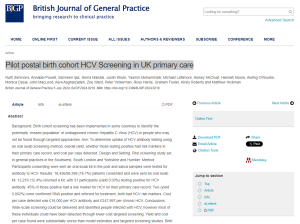Untargeted birth cohort screening for hepatitis C in primary care is unlikely to be cost-effective
22 October 2024
Birth cohort screening for undiagnosed hepatitis C identified only a small number of positive cases and was highly unlikely to be as cost-effective as other screening approaches. A study published in the British Journal of General Practice demonstrated that wide-scale screening could be delivered and identify people infected with the hepatitis C virus (HCV). However, it also confirmed that most of these people could have been found through lower-cost, targeted screening.
The study, supported by ARC West and led by researchers from the UK Health Security Agency and the National Institute for Health and Care Research (NIHR) Health Protection Research Unit (HPRU) in Behavioural Science and Evaluation at the University of Bristol and the Bristol Trials Centre, demonstrated that yield (number of positive cases found) and cost per case were worse than model estimates and targeted screening studies. This means that birth cohort screening shouldn’t be rolled out in primary care in England instead of targeted screening.
A theoretical economic model suggested that birth cohort screening might offer a cost-effective way of finding people living with undiagnosed HCV. A birth cohort study follows a group of people born at a similar date or period of time. Some countries have rolled this type of screening out to identify people who might be living with undiagnosed HCV and cannot be found through other targeted approaches. The HepCAPP study was the first study in the UK to try a birth cohort model based in general practices (GPs).
Researchers invited all patients aged 40-64 to have an HCV antibody test using an oral swab kit posted to their homes. Study participants found this approach acceptable, and uptake was better than we expected. However, it tended to be lower in younger people and more disadvantaged communities. The cost per case detected was also high at £16,000 per HCV antibody and £247,997 per chronic HCV.
Dr Kirsty Roberts, study co-lead, said:
“In England over 85 per cent of HCV transmission and the greatest burden of HCV is among people who inject or have injected drugs. The yield from HepCAPP suggests that using birth cohort screening in general practice is too low to warrant its national roll-out. Instead, targeted screening to identify people who have a history of injecting drugs or other risk factors is highly cost-effective and should continue to be implemented.”
Paper
